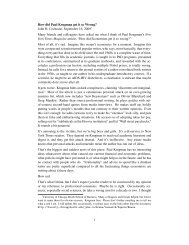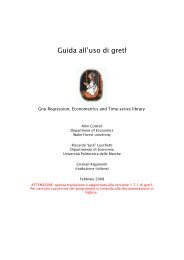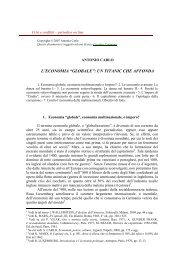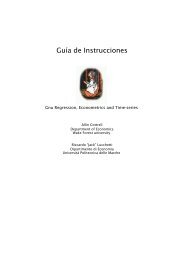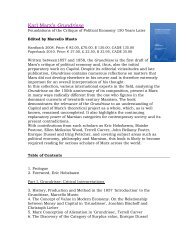The Labor Market of the Early Roman Empire - Wake Forest University
The Labor Market of the Early Roman Empire - Wake Forest University
The Labor Market of the Early Roman Empire - Wake Forest University
You also want an ePaper? Increase the reach of your titles
YUMPU automatically turns print PDFs into web optimized ePapers that Google loves.
536 | PETER TEMIN<br />
Many <strong>Roman</strong> slaves, educated or not, competed with freedmen<br />
and o<strong>the</strong>r free workers in a uni ed labor market. Various occupations<br />
emerged to meet <strong>the</strong> demands <strong>of</strong> urban residents,<br />
particularly rich ones. Skilled slaves were valuable to merchants<br />
and wealthy citizens because <strong>the</strong>y could serve as <strong>the</strong>ir agents, in<br />
<strong>the</strong> much <strong>the</strong> same way as <strong>the</strong>ir sons could: “Whatever children in<br />
our power and slaves in our possession receive by manicipatio or<br />
obtain by delivery, and whatever rights <strong>the</strong>y stipulate for or acquire<br />
by any o<strong>the</strong>r title, <strong>the</strong>y acquire for us.” Watson expressed<br />
surprise that <strong>the</strong> <strong>Roman</strong>s did not develop a law <strong>of</strong> agency, but <strong>the</strong><br />
<strong>Roman</strong>s did have a law <strong>of</strong> agency—<strong>the</strong> law <strong>of</strong> slavery (and sons).<br />
As Hicks noted, slavery was <strong>the</strong> most common formal, legally enforceable<br />
long-term labor contract in <strong>the</strong> early <strong>Roman</strong> empire. A<br />
person with a long-term relation to a principal would be his or her<br />
most responsible representative. Slaves were more valuable than<br />
free men in that respect. Witness <strong>the</strong> frequent references to literate,<br />
skilled slave agents in <strong>the</strong> surviving sources. 44<br />
Columella (1.8.1-2) aptly exposed <strong>the</strong> difference between<br />
ancient and modern slavery: “So my advice at <strong>the</strong> start is not to<br />
appoint an overseer from that sort <strong>of</strong> slaves who are physically attractive<br />
and certainly not from that class which has busied itself<br />
with <strong>the</strong> voluptuous occupations <strong>of</strong> <strong>the</strong> city.” This warning would<br />
not, and could not, apply to modern slavery, both because modern<br />
slaves could not indulge in “voluptuous occupations” like<br />
Columella’s list <strong>of</strong> <strong>the</strong>ater, gambling, restaurants, etc., and because<br />
a modern slave could not have been appointed as manager <strong>of</strong> a<br />
substantial estate. 45<br />
Implicit in Columella’s advice is <strong>the</strong> ease with which slaves<br />
could change jobs. For example, when Horace was given an estate<br />
allel Lives (London, 1914; orig. pub. early 2d century), II, 21; Va. Code [1848], 747–748. Education<br />
does not even appear in <strong>the</strong> index to Fogel and Engerman, Time on <strong>the</strong> Cross. So few<br />
Brazilians <strong>of</strong> any sort were educated that no contrast between slaves and free workers in this<br />
context is possible.<br />
44 Gaius (trans. W. M. Gordon and O. F. Robinson), Institutiones (Ithaca, 1988; orig. pub.<br />
c. 161), 2.87; Watson, <strong>Roman</strong> Slave Law, 107; Hicks, <strong>The</strong>ory. See Andrew Lintott, “Freedmen<br />
and Slaves in <strong>the</strong> Light <strong>of</strong> Legal Documents from First-Century A.D. Campania,” Classical<br />
Quarterly, LII (2002), 555–565, for a vivid description <strong>of</strong> slaves and freedmen as agents in <strong>the</strong><br />
records <strong>of</strong> a commercial house in Puteoli. Free people were also agents. <strong>Roman</strong> jurists began<br />
to correct <strong>the</strong> legal discrepancy between <strong>the</strong>m and slave agents in <strong>the</strong> Principate ( Johnston,<br />
<strong>Roman</strong> Law, 106).<br />
45 Columella, 1.8.1-2: “Igitur praemoneo ne vilicum ex eo genere servorum, qui corpore<br />
placuerunt, instituamus, ne ex eo quidem ordine, qui urbanes ac delicates artes exercuerit.”



